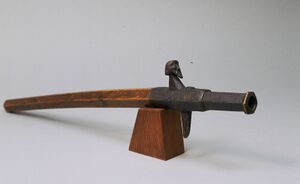Drekkanon: Difference between revisions
No edit summary |
No edit summary |
||
| Line 1: | Line 1: | ||
[[File:Drekkanon14.jpg|thumb|right|300px| | [[File:Drekkanon14.jpg|thumb|right|300px|11th century Drekkanon decorated with the likeness of King Vaekar II.]] | ||
The '''Drekkanon''', also commonly called a '''Eldgeirr''' (Elder Nordic: ''Fire Spear'') and sometimes referred to as a '''Eldcanna''', or '''Eldcanone''', was an early handheld gunpowder weapon developed in Acrea. It arose as a development of the '''''Drekaspjót''''' or Dragon Lance, a relatively small pyrotechnic weapon affixed to a polearm first used in the 9th century which used gunpowder originally packed behind a ceramic or glass vial containing [[Drekaeldur|Dragonfire]], which ignited and propelled the substance when lit. Improved gunpowder later led to these weapons being loaded with iron or ceramic shot, until eventually the polearm component was discarded entirely. | The '''Drekkanon''', also commonly called a '''Eldgeirr''' (Elder Nordic: ''Fire Spear'') and sometimes referred to as a '''Eldcanna''', or '''Eldcanone''', was an early handheld gunpowder weapon developed in Acrea. It arose as a development of the '''''Drekaspjót''''' or Dragon Lance, a relatively small pyrotechnic weapon affixed to a polearm first used in the 9th century which used gunpowder originally packed behind a ceramic or glass vial containing [[Drekaeldur|Dragonfire]], which ignited and propelled the substance when lit. Improved gunpowder later led to these weapons being loaded with iron or ceramic shot, until eventually the polearm component was discarded entirely. | ||
| Line 5: | Line 5: | ||
The Drekkanon saw widespread use in Acrea beginning in the 11th century. Drekkanons were considered to be an effective alternative to crossbows, which at the time was the dominant ranged weapon in Acrea. Little more than forged barrels with some kind of fixture, Drekkanons lacked any sort of firing mechanism and had to be manually fired via a lit match through a touchhole. Designs, sizes, and styles of Drekkanon varied significantly across Acrea. They were often used in conjunction with crossbow- or bow-armed troops; Drekkanons were slower to load and vulnerable to the weather, but much more powerful and had greater range. | The Drekkanon saw widespread use in Acrea beginning in the 11th century. Drekkanons were considered to be an effective alternative to crossbows, which at the time was the dominant ranged weapon in Acrea. Little more than forged barrels with some kind of fixture, Drekkanons lacked any sort of firing mechanism and had to be manually fired via a lit match through a touchhole. Designs, sizes, and styles of Drekkanon varied significantly across Acrea. They were often used in conjunction with crossbow- or bow-armed troops; Drekkanons were slower to load and vulnerable to the weather, but much more powerful and had greater range. | ||
Progressive advancements in gunpowder technology, such as {{wp|Gunpowder#Corning|corned powder}}, led to the development of the | Progressive advancements in gunpowder technology, such as {{wp|Gunpowder#Corning|corned powder}}, led to the development of superior gunpowder weapons that superseded the Drekkanon. | ||
==History== | ==History== | ||
Latest revision as of 04:16, 19 September 2022
The Drekkanon, also commonly called a Eldgeirr (Elder Nordic: Fire Spear) and sometimes referred to as a Eldcanna, or Eldcanone, was an early handheld gunpowder weapon developed in Acrea. It arose as a development of the Drekaspjót or Dragon Lance, a relatively small pyrotechnic weapon affixed to a polearm first used in the 9th century which used gunpowder originally packed behind a ceramic or glass vial containing Dragonfire, which ignited and propelled the substance when lit. Improved gunpowder later led to these weapons being loaded with iron or ceramic shot, until eventually the polearm component was discarded entirely.
The Drekkanon saw widespread use in Acrea beginning in the 11th century. Drekkanons were considered to be an effective alternative to crossbows, which at the time was the dominant ranged weapon in Acrea. Little more than forged barrels with some kind of fixture, Drekkanons lacked any sort of firing mechanism and had to be manually fired via a lit match through a touchhole. Designs, sizes, and styles of Drekkanon varied significantly across Acrea. They were often used in conjunction with crossbow- or bow-armed troops; Drekkanons were slower to load and vulnerable to the weather, but much more powerful and had greater range.
Progressive advancements in gunpowder technology, such as corned powder, led to the development of superior gunpowder weapons that superseded the Drekkanon.
History
Early Types
The most common early Drekkanons were of a type retroactively called the Lacsteypuhræra. Loosely translating to "hand mortar" or "hand bombard", Lacsteypuhræra were the simplest construction of Drekkanon and consisted only of a forged barrel affixed to a longer handle, which could be made of either metal or wood.
